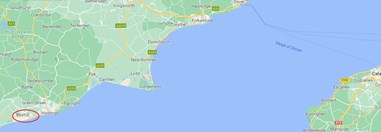“This Bill has no sense at all of the long-term and of the global nature of the challenge that the world faces. It ignores the reality that migration must be engaged with at source, as well as in the Channel, as if we, as a country, were unrelated to the rest of the world.”
Archbishop of Canterbury, Justin Welby
The Archbishop of Canterbury has had a busy week following his central role in the Coronation: the Second Reading of the Illegal Migration Bill in the House of Lords was the backdrop for his major intervention in parliament on Wednesday 10th May.
There has been a vigorous debate over the past few days following his robust criticism of the Bill: the BBC's Question Time programme, broadcast from Bexhill-on-Sea, devoted half its time to the issue, and there has been a steady flow of correspondence in the media. It's a big issue, as Prime Minister Rishi Sunak recognised when he pledged to ‘stop the boats’.
But the Archbishop is correct in his analysis that the Bill is trying to deal with the short-term symptoms rather than the long-term causes of migration. He identifies those causes as conflict, poverty and climate change: the same issues to which we drew attention in our commentary last week (Democracy's Struggle with the Long-Term).
Migrant boats in the English Channel are therefore just the tip of an enormous iceberg which can only be tackled by finding answers to those long-term causes.
Democracy, however, really struggles to deal with long-term issues. Further to our commentary last week, I look forward to discussing the attached paper in a series of meetings arranged in Westminster this week to explore how we might address this going forwards. For now, however, the Government remains fixated on the short-term with the next General Election due to take place by December 2024. It is understandable that their focus is therefore on addressing symptoms rather than causes.
 When you look at those symptoms — the migrant crossings — it's clear why it raises the concerns which Bexhill residents expressed during the BBC’s Question Time programme, particularly in relation to the impending installation of a migrant detention centre at the former Northeye Prison. As shown on the Migration Watch website, over 87% of ‘illegal boat crossers’ are male, and 75% are aged between18 and 39; although the majority are refugees, a very small minority are families who remain in distress in the countries from which their menfolk have fled. Everyone acknowledges the part that traffickers play in this process (including Archbishop Justin, who described them as appalling criminals).
When you look at those symptoms — the migrant crossings — it's clear why it raises the concerns which Bexhill residents expressed during the BBC’s Question Time programme, particularly in relation to the impending installation of a migrant detention centre at the former Northeye Prison. As shown on the Migration Watch website, over 87% of ‘illegal boat crossers’ are male, and 75% are aged between18 and 39; although the majority are refugees, a very small minority are families who remain in distress in the countries from which their menfolk have fled. Everyone acknowledges the part that traffickers play in this process (including Archbishop Justin, who described them as appalling criminals).
But none of this changes the fact that it is the pressures of conflict, poverty and climate change which are causing most of these young men to flee their countries: and what are we doing about that? The Archbishop is correct to say ‘not much’ — here is his speech, as delivered last Wednesday.
As he says, it is morally unacceptable and politically impractical to let the poorest countries deal with the crisis alone — and he references the United Kingdom’s continuing cuts in international aid as evidence of our lack of co-operation.
The answer has to be to explore and develop the long-term solutions to these causes. The challenge of climate change is being addressed well in many quarters. At Share Radio and Share Alliance, our contribution has dwelt mainly on:
- tackling poverty by introducing a more egalitarian form of capitalism; and
- resolving conflict by moving towards more effective global co-operation and governance.
Voluntary organisations such as Five Talents are already very active in trying to tackle the challenge of poverty, and a useful start could be made by the UK Government partnering with the activity of such organisations, particularly in Commonwealth countries, alongside its efforts to tackle the symptoms: that is, illegal boat crossings.
On top of that cut in international aid, it's interesting to note that more than 40% of Britain's development aid budget was spent by departments outside the Foreign and Commonwealth ministry in 2022. Most of this diverted cash went to domestic ministries which increased their spending by 130% to £2.4 billion in order to fund the rise in asylum seeker accommodation costs.
Just as the tip of an iceberg will never disappear until its underwater bulk is dissolved, short-term symptoms will stay with us for as long as we fail to tackle the long-term causes. As Justin Welby says, there is no point in being isolationist on these issues; and it is a denial of our heritage to shrink away from international co-operation and support. We must accept that the world is becoming more integrated, and we should be at the centre of that process.
Gavin Oldham OBE
Share Radio

